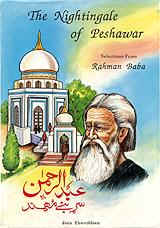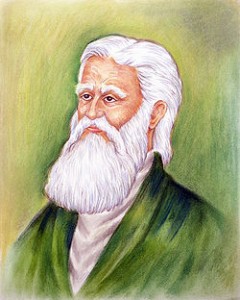Rahman Baba (1650—1715) Posted by Transparent Language on Nov 23, 2010 in Uncategorized
“Monarchy owes itself to the prayers of beggars”
“I, Rahman, am a king because I am a beggar”
Rahman Baba (whose full name was Abdur-Rahman), was a legendary Pashto poet who was known for his Sufism. He has enlightened Pashtoons through his legendary poetry for over 300 years. Pashtoons around the world honor Rahman Baba with the name “Baba,” meaning “grandfather.” Rahman Baba was born to the Saban tribe in 1650 in Peshawar, when Mughals were ruling the sub-continent. His forefathers migrated from the city of Kandhar, Afghanistan and settled in Peshawar valley. Through his Sufi poetry, Rahman Baba spread Islamic Theology in Pashtoon society and is credited as the most popular poet in Pashtoon history.
Rahman Baba lived a very simple life, which can be inferred from his verse:
بادشاهان که اوبه سکي په جام ده زرو
Though the wealthy drink water from a Golden Cup
مارحمان له ده خاوروکنډول بس دے
I Rahman, prefer this clay bowl.
http://www.youtube.com/watch?v=sch1wM02hI0
By reading the spiritual poetry of Rahman Baba, some Muslims would think that life in this world will one day be lost. However, others believe that life after death is eternal and that Rahman Baba will live for an indefinite period of time. Some believe that Allah Subhanahu wa Taala has sent us to this world to fulfill the demands of Allah and spend our lives according to the teaching of Muhammad Salulahu Alaihe Wa Salum (Peace Be Upon Him).
Rahman Baba is one of the most admired poets in the Pashto literature and was named the most prestigious poet by Pashto Academy. He lived a life in solitude with no disturbance when he prayed to God. In his work “Da Baba pa Dewan Kay,” Abduraf Benawa stated that Rahman Baba’s poetry serves as a motivator to do good and refrain from following the way of evils. One of the most renowned scholars in Pashto language, Jeebi admired the work of Rahman Baba and said: “Rahman Baba in his poetry has used a very simple language, and most of his poetry revolves around love, ethics, Islamic theology, and social problems, and if we remove Rahman Baba from the Pashto Sufism, it will simply become a valueless topic”.

A collection of Rahman Baba’s work titled “Da Rahman Baba Daiwan” (Anthology of Rahman Baba) was been published in 1710. More than 25 manuscripts can be found in libraries across the globe including Pashto Academy, University of Peshawar, Bedleian Library Oxford, British Library, Bibliotheque Nationale in Paris, University Library Aligarh India, and John Ryland’s Library Manchester UK.
Various scholars from around the world, including H.G. Raveerty, Raobert Sampson, Momin Khan, Adnan Riaz, Iskandar Zaidi, etc have written theses regarding the work of Rahman Baba. Over many years citizens, scholars, and political readers have recognized the power and great meaning in Rahman Baba’s poetry. Many people from Khyber Pakhtoonkhwa, across Afghanistan, Central Asia, the Indian subcontinent, and the rest of the world have celebrated Rahman Baba’s creations in writing, the spoken word, and music.

Build vocabulary, practice pronunciation, and more with Transparent Language Online. Available anytime, anywhere, on any device.
About the Author: Transparent Language
Transparent Language is a leading provider of best-practice language learning software for consumers, government agencies, educational institutions, and businesses. We want everyone to love learning language as much as we do, so we provide a large offering of free resources and social media communities to help you do just that!





Comments:
jalil ahmad:
i want rahman baba book in pashto
Hatef:
Great post. It really portrays a perfect picture of a divine personality.
Regards
Hatef
nisar:
i want Rehmaan Baba dewan,,
nargis:
A great poet of the pushto history